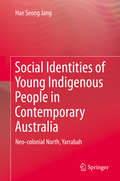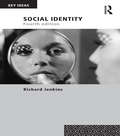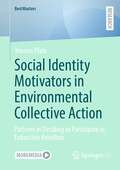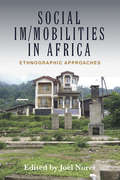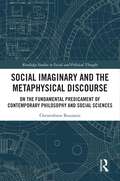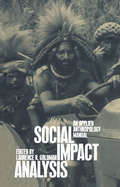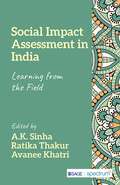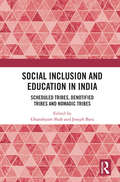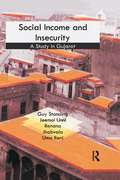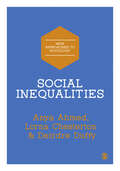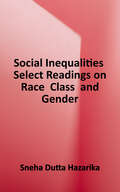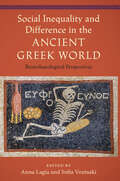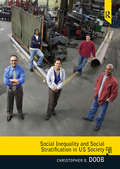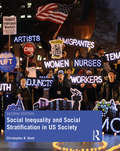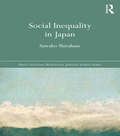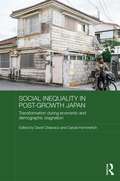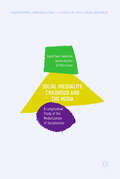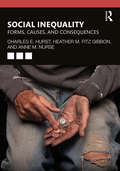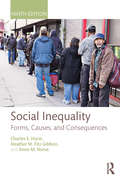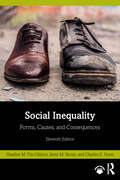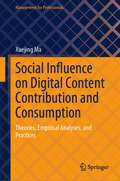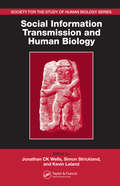- Table View
- List View
Social Identities of Young Indigenous People in Contemporary Australia
by Hae Seong JangThis volume is about the social identities of young Indigenous people in contemporary Australia, based on fieldwork in the rural community of Yarrabah, in Queensland. This case study of Yarrabah is based on seventeen ethnographic interviews with women and men in their twenties. With the aim of exploring how diverse social discourses have influenced the social identities of young Indigenous people in contemporary Australia, this book represents the life histories of these young people in Yarrabah in the context of both the institutions with which they interact and the everyday shape of life in Yarrabah. This volume also provides new material for discussion of the ways in which Indigenous value systems, broadly understood by the participants to be based on collectivism, constantly come into conflict with Western values based on individualism. While the young Indigenous people of Yarrabah do continuously interact not only with multi‑cultural Australia but also with global influences, they are constantly aware of their own distinctiveness in both contexts.
Social Identity (Key Ideas)
by Richard JenkinsSocial Identity explains how identification, seen as a social process, works: individually, interactionally and institutionally. Building on the international success of previous editions, this fourth edition offers a concise, comprehensive and readable critical introduction to social science theories of identity for advanced undergraduates and postgraduates. All the chapters have been updated, and extra new material has been added where relevant, integrating the most recent critical publications in the field. As with the earlier editions, the emphasis is on sociology, anthropology and social psychology; on the interplay between relationships of similarity and difference; on interaction; on the categorisation of others as well as self-identification; and on power, institutions and organisations. Written in clear, accessible language, and informed by relevant topical examples throughout, this fully updated new edition will be useful for students interested in social identity throughout the social sciences and humanities.
Social Identity Motivators in Environmental Collective Action: Patterns in Deciding to Participate in Extinction Rebellion (BestMasters)
by Yvonne PlateSocial Identity research has found prominence in the realm of collective action but lacks an environmental activism focus. This study gathers individuals’ experiences to explore the influences on decision-making processes to join an environmental activist group – the local Extinction Rebellion (XR) group in Stuttgart, Germany. This case study is used to identify patterns in this process, to test the applicability of existing models and to explore the significance of social identity. Activists and past activists were interviewed. The results make it apparent that the existing models are not sufficient to represent social identity processes in environmental activism. The findings are visualized in a suggested adjusted model of collective action, which suggests norms and morals and (politicized) social identity as a twin core influencing collective action. Social identity retains its significance at the center of the model. Furthermore, it is suggested that collective efficacy beliefs and a sense of agency are interchangeable factors influencing the twin core and collective action directly. Injustice perceptions remain essential. Social connections, group identification, group dynamics, participatory efficacy, self-identity, and image are found to play a role occasionally but require further investigation. The convergence of collective efficacy beliefs and a sense of agency and the valuation of factors present especially relevant future research topics.
Social Im/mobilities in Africa: Ethnographic Approaches
by Joël NoretGrounded in both theory and ethnography, this volume insists on taking social positionality seriously when accounting for Africa’s current age of polarizing wealth. To this end, the book advocates a multidimensional view of African societies, in which social positions consist of a variety of intersecting social powers - or ‘capitals’ – including wealth, education, social relationships, religion, ethnicity, and others. Accordingly, the notion of social im/mobilities emphasizes the complexities of current changes, taking us beyond the prism of a one-dimensional social ladder, for social moves cannot always be apprehended through the binaries of ‘gains’ and ‘losses’.
Social Im/mobilities in Africa: Ethnographic Approaches
by Joël NoretGrounded in both theory and ethnography, this volume insists on taking social positionality seriously when accounting for Africa’s current age of polarizing wealth. To this end, the book advocates a multidimensional view of African societies, in which social positions consist of a variety of intersecting social powers - or ‘capitals’ – including wealth, education, social relationships, religion, ethnicity, and others. Accordingly, the notion of social im/mobilities emphasizes the complexities of current changes, taking us beyond the prism of a one-dimensional social ladder, for social moves cannot always be apprehended through the binaries of ‘gains’ and ‘losses’.
Social Imaginary and the Metaphysical Discourse: On the Fundamental Predicament of Contemporary Philosophy and Social Sciences (Routledge Studies in Social and Political Thought)
by Christoforos BouzanisThis book departs from approaches to truth in social science and ideas in philosophy that connect truth to the ability of language to fulfil certain ‘real-world’ conditions of objectivity. Pointing to an extra-linguistic level in our cognition at which scientific creativity occurs, it highlights the manner in which epistemic communities share, work on and modify not only the world-imaginaries that they endorse, but also those world-views that they reject or which partially overlap with their own. Through the concept of the social imaginary, the author explores the theoretical interrelations among various metaphysical world-imageries by which we organise our scientific understanding of the world and our expectations of experience, thus shedding light on the manner in which social ontology can inform our practices of sharing belief. A study at the intersection of metaphysics and social theory, The Fundamental Predicament of Contemporary Philosophy and the Social Sciences will appeal to scholars of sociology and philosophy with interests in questions of ontology and epistemology.
Social Impact Analysis: An Applied Anthropology Manual
by Laurence R. GoldmanThis book addresses the nature, purpose and processes associated with social impact analysis. Because resource development projects occur in human as well as ecological environments, stakeholders - landowners, companies and governments - are compelled to ensure that the benefits of any project are maximized while the negative risks are minimized. Achieving such objectives means implementing programs which monitor and evaluate the ongoing effects of a project on the social and cultural lives of the impacted populace. This book aims to provide a teaching and training resource for students, social scientists (anthropologists, sociologists, human geographers, environmentalists, engineers, etc.) and indigenous personnel and operators who are tasked with community affairs programs in those countries where resource development projects are implemented. The constituent chapters provide how-to guides and frameworks that are generously illustrated with case studies drawn variously from North America and the Asia-Pacific region. Topics addressed include Legal Frameworks and Compliance Procedures, Social Mapping, Environmental Reports, Social and Economic Impact Studies, Social Monitoring Techniques, Project Development, Statistical Packages and Report Production.This book is unique in so far as it seeks to prioritize application over theory. Moreover, it is the first training resource that is sensitive to non-western indigenes' need to assimilate and apply skills engendered by Western countries.
Social Impact Assessment in India: Learning from the Field
by A. K. Sinha Ratika Thakur Avanee KhatriThis book is a discourse on social impact assessment (SIA), an important tool for identifying and managing impacts of a development project. It provides an outlook on judicial, methodological and ethical complexities in SIA. The book also offers anthropological critique of SIA and collates experiences of practitioners and researchers from India, with the objective of sharpening SIA with redefined practices. Social Impact Assessment in India discusses direct and indirect impacts on project-affected people (displaced and relocated) and the role (ethical and financial) of funding agencies, including legalities and associated vulnerabilities. The strength of this book lies in its field-based approach revealing ground realities and the authors' reflections and insights on situations on the field, across different regions of India.
Social Inclusion and Education in India: Scheduled Tribes, Denotified Tribes and Nomadic Tribes
by Ghanshyam Shah Joseph BaraThis book examines social inclusion in the education sector in India for scheduled tribes (ST), denotified tribes and nomadic tribes. It investigates the gaps between what was promised to the marginalized sections in the constitution, and what has since been delivered. The volume:• Examines data from across the Indian states on ST and non-ST students in higher, primary and secondary education;• Analyses the success and failures of education policy at the central and state level;• Brings to the fore colonial roots of social exclusion in education. A major study, the volume will be of great interest to scholars and researchers of education, sociology and social anthropology, development studies and South Asian studies.
Social Income and Insecurity: A Study in Gujarat
by Guy Standing Renana Jhabvala Jeemol Unni Uma RaniEconomic liberalisation associated with globalisation is causing a pervasive growth of economic insecurity experienced all over the world. This is placing urgent demands on policymakers to rethink old policies and institutions. This book sets out a new approach to the assessment of income dynamics, based on identifying the diverse components of people’s income and entitlements. It defines ‘social income’ as a broader concept of household income which includes state, community and private benefits. It shows how those components should be measured and provides a composite picture of the structure of incomes and support systems of different societal groups. It recognises how the structure of income, as well as its distribution, has been linked to policy and development dynamics. It starts from a premise that unless the totality of incomes and income support systems is taken into account, academics and policymakers cannot expect to develop appropriate interventions. This perspective is developed though a detailed household survey conducted in rural and urban areas of Gujarat in 2007–2008. This provides an up-to-date picture of how institutions, NGOs and the state system are operating in the context of rapid restructuring of village life in India.
Social Inequalities (New Approaches to Sociology)
by Anya Ahmed Deirdre Duffy Lorna ChestertonPart of the New Approaches to Sociology series, Social Inequalities is a relevant and valuable exploration of how we see the world, through a decolonised lens. Aimed at undergraduate and postgraduate students of sociology, this textbook offers a critical re-reading of traditional approaches to understanding social inequalities and responds to the call from university administrations, academics and students to decolonise the curriculum and challenge its lack of diversity. It presents an intersectional approach to understanding diversity and social inequalities and, in so doing, allows for alternative knowledge sources and voices to be heard. From looking at social groups such as race, age, sexuality and class alongside a nuanced evaluation of traditional sociological theories such as Marxism, functionalism and feminism – this book is an expert guide to the debates central to understanding the challenges individuals face in society. Including personal stories and case studies, students will be exposed to an authentic and real-world view of how individuals have encountered discrimination. Social Inequalities is an essential resource for anyone working and studying across sociology, and anyone interested in challenging established ways of looking at the world. Professor Anya Ahmed, Dr Deirdre Duffy and Dr Lorna Chesterton work in the faculty of health and education at Manchester Metropolitan University, UK.
Social Inequalities (New Approaches to Sociology)
by Anya Ahmed Deirdre Duffy Lorna ChestertonPart of the New Approaches to Sociology series, Social Inequalities is a relevant and valuable exploration of how we see the world, through a decolonised lens. Aimed at undergraduate and postgraduate students of sociology, this textbook offers a critical re-reading of traditional approaches to understanding social inequalities and responds to the call from university administrations, academics and students to decolonise the curriculum and challenge its lack of diversity. It presents an intersectional approach to understanding diversity and social inequalities and, in so doing, allows for alternative knowledge sources and voices to be heard. From looking at social groups such as race, age, sexuality and class alongside a nuanced evaluation of traditional sociological theories such as Marxism, functionalism and feminism – this book is an expert guide to the debates central to understanding the challenges individuals face in society. Including personal stories and case studies, students will be exposed to an authentic and real-world view of how individuals have encountered discrimination. Social Inequalities is an essential resource for anyone working and studying across sociology, and anyone interested in challenging established ways of looking at the world. Professor Anya Ahmed, Dr Deirdre Duffy and Dr Lorna Chesterton work in the faculty of health and education at Manchester Metropolitan University, UK.
Social Inequalities: Select Readings on Race, Class, and Gender
by Sneha Dutta HazarikaFeaturing an intersectional approach, this text introduces students to social inequalities embedded within society at both the micro and macro level. Through compelling, scholarly articles, students gain the knowledge necessary to address social inequalities and inspire social change. The anthology features six distinct units. <p><p>Unit I focuses on race, racism, and immigration and features readings on racial formation, defining racism, and the consequences of racism on U.S. immigration policy. In Unit II, students read about gender, patriarchy, and formal and informal discrimination against women at work. Unit III features coverage of social class, power, and privilege, and Unit IV speaks to the tensions between wealth, privilege, and inequality. Students learn about inequality and discrimination within social institutions like schools, housing, and mass incarceration. The final unit encourages students to pursue social change and social transformation. <p><p>This book is an ideal reader for courses in sociology, women and gender studies, and race and ethnic studies, as well as those that address social stratification and the intersectionality of race, ethnicity, class, and gender.
Social Inequality and Difference in the Ancient Greek World: Bioarchaeological Perspectives (Bioarchaeological Interpretations of the Human Past: Local, Regional, and Global Perspectives)
by Sofia Voutsaki Anna LagiaExploring the relationship between health and inequality in the societies of ancient GreeceIn this volume, bioarchaeologists, osteologists, archaeologists, and paleopathologists examine the ways social inequalities and differences affected health and wellbeing in ancient Greece. Although the ancient Greek civilization is often associated with the ideals of democracy and social equality, the region was characterized by pervasive divisions. Moving beyond elitism and idealization, this book focuses on health-related disparities and difference.Case studies cover a wide temporal range—from the eleventh century BCE through the sixth century CE, a period not usually examined in bioarchaeological studies of the region—and geographical areas including city-states in the Greek mainland, the Aegean islands, the Ionian coast, Albania, and Southern Italy. Comparing health-related data across social groups and sociopolitical systems, contributors explore the relationships between colonists and Indigenous communities, strategies of inclusion and exclusion in mortuary practices, and the impact of urbanization and Romanization on health, diet, and growth. This book also discusses methodological questions such as the challenges posed by poor skeletal preservation, small sample sizes, and incomplete or legacy data.With a focus on marginalized groups including ordinary people, women, children, and enslaved workers, Social Inequality and Difference in the Ancient Greek World shows how bioarchaeology can dialogue with the disciplines of archaeology and ancient history to explore subjects such as health, inequality, ethnicity, age, and gender. This book opens a new avenue for addressing questions concerning living standards in the ancient world. Contributors: Hannah Liedl | Lukas Waltenberger | Britney Kyle | Dimitra Ermioni Michael | Victoria Sabetai | Carrie L. Sulosky Weaver | Anna Lagia | Elena Vlachogianni | Sandra Garvie-Lok | Jane Buikstra | Reine-Marie Bérard | Christina Papageorgopoulou | Efthymia Nikita | Aliya R. Hoff | Eleni-Anna Prevedorou | Sofia Voutsaki | Lisa Steige | Sam Cleymans | Paraskevi TritsaroliA volume in the series Bioarchaeological Interpretations of the Human Past: Local, Regional, and Global Perspectives, edited by Clark Spencer Larsen
Social Inequality and Social Stratification in U.S. Society
by Christopher B. DoobSocial Inequality - examining our present while understanding our past. Social Inequality and Social Statification in US Society, 1st edition uses a historical and conceptual framework to explain social stratification and social inequality. The historical scope gives context to each issue discussed and allows the reader to understand how each topic has evolved over the course of American history. The authors use qualitative data to help explain socioeconomic issues and connect related topics. Each chapter examines major concepts, so readers can see how an individual's success in stratified settings often relies heavily on their access to valued resources-types of capital which involve finances, schooling, social networking, and cultural competence. Analyzing the impact of capital types throughout the text helps map out the prospects for individuals, families, and also classes to maintain or alter their position in social-stratification systems. Learning Goals Upon completing this book, readers will be able to: Analyze the four major American classes, as well as how race and gender are linked to inequalities in the United States Understand attempts to reduce social inequality Identify major historical events that have influenced current trends Understand how qualitative sources help reveal the inner workings that accompany people's struggles with the socioeconomic order Recognize the impact of social-stratification systems on individuals and families
Social Inequality and Social Stratification in US Society
by Christopher B. DoobSocial Inequality and Social Stratification in US Society uses a historical and conceptual framework to explain social stratification and social inequality. The historical scope gives context to each issue discussed and allows the reader to understand how each topic has evolved over the course of American history. The author uses qualitative data to help explain socioeconomic issues and connect related topics. Each chapter examines major concepts, so readers can see how an individual’s success in stratified settings often relies heavily on their access to valued resources—types of capital which involve finances, schooling, social networking, and cultural competence. Analyzing the impact of capital types throughout the text helps map out the prospects for individuals, families, and also classes to maintain or alter their position in social-stratification systems.
Social Inequality in Japan: Social Inequality In Japan (Nissan Institute/Routledge Japanese Studies)
by Sawako ShirahaseJapan was the first Asian country to become a mature industrial society, and throughout the 1970s and the 1980s, was viewed as an ‘all-middle-class society’. However since the 1990s there have been growing doubts as to the real degree of social equality in Japan, particularly in the context of dramatic demographic shifts as the population ages whilst fertility levels continue to fall. This book compares Japan with America, Britain, Italy, France, Germany, Sweden and Taiwan in order to determine whether inequality really is a social problem in Japan. With a focus on impact demographic shifts, Sawako Shirahase examines female labour market participation, income inequality among households with children, the state of the family, generational change, single person households and income distribution among the aged, and asks whether increasing inequality and is uniquely Japanese, or if it is a social problem common across all of the societies included in this study. Crucially, this book shows that Japan is distinctive not in terms of the degree of inequality in the society, but rather, in how acutely inequality is perceived. Further, the data shows that Japan differs from the other countries examined in terms of the gender gap in both the labour market and the family, and in inequality among single-person households – single men and women, including lifelong bachelors and spinsters – and also among single parent households, who pay a heavy price for having deviated from the expected pattern of life in Japan. Drawing on extensive empirical data, this book will be of great interest to students and scholars interested in Japanese culture and society, Japanese studies and social policy more generally.
Social Inequality in Post-Growth Japan: Transformation during Economic and Demographic Stagnation (Routledge Contemporary Japan Series)
by David Chiavacci Carola HommerichIn recent decades Japan has changed from a strongly growing, economically successful nation regarded as prime example of social equality and inclusion, to a nation with a stagnating economy, a shrinking population and a very high proportion of elderly people. Within this, new forms of inequality are emerging and deepening, and a new model of Japan as 'gap society' (kakusa shakai) has become common-sense. These new forms of inequality are complex, are caused in different ways by a variety of factors, and require deep-seated reforms in order to remedy them. This book provides a comprehensive overview of inequality in contemporary Japan. It examines inequality in labour and employment, in welfare and family, in education and social mobility, in the urban-rural divide, and concerning immigration, ethnic minorities and gender. The book also considers the widespread anxiety effect of the fear of inequality; and discusses how far these developments in Japan represent a new form of social problem for the wider world.
Social Inequality, Childhood and the Media: A Longitudinal Study of the Mediatization of Socialisation (Transforming Communications – Studies in Cross-Media Research)
by Ingrid Paus-Hasebrink Jasmin Kulterer Philip SinnerThis open access book presents a qualitative longitudinal panel-study on child and adolescent socialisation in socially disadvantaged families. The study traces how children and their parents make sense of media within the context of their everyday life over twelve years (from 2005 to 2017) and provides a unique perspective on the role of different socialisation contexts, drawing on rich data from a broad range of qualitative methods. Using a theoretical framework and methodological approach that can be applied transnationally, it sheds light on the complex interplay of factors which shape children’s socialisation and media usage in multiple ways.
Social Inequality: Forms, Causes, and Consequences
by Charles E. Hurst Heather M Fitz Gibbon Anne M NurseLike past editions, this tenth edition of Social Inequality: Forms, Causes, and Consequences is a user-friendly introduction to the study of social inequality. This book conveys the pervasiveness and extensiveness of social inequality in the United States within a comparative context, to show how inequality occurs, how it affects all of us, and what is being done about it. This edition benefits from a variety of changes that have significantly strengthened the text. The authors pay increased attention to disability, intersectionality, immigration, religion, and place. This edition also spotlights crime and the criminal justice system as well as health and the environment. The tenth edition includes a new chapter on policy alternatives and venues for social change.
Social Inequality: Forms, Causes, and Consequences
by Charles E. Hurst Heather M. Fitz Gibbon Anne M. NurseLike past editions, this ninth edition of Social Inequality: Forms, Causes, and Consequences is a user-friendly introduction to the study of social inequality. This book conveys the pervasiveness and extensiveness of social inequality in the United States within a comparative context, to show how inequality occurs, how it affects all of us, and what is being done about it. This edition benefits from a variety of changes that have significantly strengthened the text. The authors pay increased attention to disability, transgender issues, intersectionality, experiences of Muslims, Hispanic populations, and immigration. The 9th edition also includes content on the fall-out from the recession across various groups. The sections on global inequalities have been greatly updated, emphasizing comparative inequalities and the impact of the process of globalization on inequality internationally. The authors have also added material on several current social movements, including Occupy Wall Street, Black Lives Matter, and Marriage Equality.
Social Inequality: Forms, Causes, and Consequences
by Charles E. Hurst Anne M. Nurse Heather M. Fitz GibbonThe eleventh edition of Social Inequality: Forms, Causes, and Consequences is an introduction to the study of social inequality. Fully updated statistics and examples convey the pervasiveness and extent of social inequality in the United States. The authors use an intersectional perspective to show how inequality occurs, how it affects all of us, and what is being done about it. With more resources and supplementary examples, exercises, and applications embedded throughout to aid students’ learning and visualization of important concepts, the book provides a rich theoretical treatment to address the current state of inequality. In line with current affairs, the authors have expanded the content to include: An intersectional approach throughout the chapters; A stronger emphasis on the connections between poverty, wealth, and income inequality; New case studies on the opioid epidemic, COVID-19, the lead poisoning crisis, and climate change; A new focus on the rise of right-wing movements. With additional content and classroom extensions available online for instructors, Social Inequality remains an ideal and invaluable overview of the subject and provides undergraduate students with a robust understanding of social inequality from a sociological perspective.
Social Influence on Digital Content Contribution and Consumption: Theories, Empirical Analyses, and Practices (Management for Professionals)
by Xuejing MaThis book examines users’ digital content contribution and consumption behavior from a social perspective. Digital content is everywhere—from search results on search engines to posts on social media. Incentivizing users to contribute abundant content and motivating users to engage in and pay for digital content are vital for online platforms, especially those relying on digital content generated by users. This book develops a theoretical framework to incorporate social influence, including social presence, social interaction, social comparison, social loafing, and social relationships, in users’ digital content contribution and consumption decisions. Further, using a large volume of data from online platforms, the author empirically studies the role of social interaction in digital content provision and monetization from the supply side. Also, regarding the digital content demand side, this book explores how to boost content consumption via social motives and social norms. The book enriches the understanding of social influence in digital content contribution and consumption and provides practical suggestions for digital platforms’ mechanism design.
Social Influences on Romantic Relationships
by Christopher R. AgnewHow do we choose a partner to initiate a relationship with, and what makes us stay in a given relationship over time? These questions are most often pursued by scholars with an emphasis on the internal thoughts, feelings, and motivations of individual decision-makers. Conversely, this volume highlights the importance of considering external influences on individual decision-making in close relationships. Featuring contributions from internationally renowned scholars, the volume is divided into two interrelated sections. The first section considers global and societal influences on romantic relationships and the second focuses on social network and communicative influences on romantic relationships. Taken together, this collection helps us to better understand how external factors influence the internal machinations of those involved in intimate relationships.
Social Information Transmission and Human Biology (Society for the Study of Human Biology)
by Kevin Laland Jonathan Ck Wells Simon StricklandRecent research has emphasized that socially transmitted information may affect both the gene pool and the phenotypes of individuals and populations, and that an improved understanding of evolutionary issues is beneficial to those working towards the improvement of human health. In response to a growing interest across disciplines for information regarding the contribution of social behavior to a range of biological outcomes, Social Information Transmission and Human Biology connects the work of evolutionary theorists and those dealing with practical issues in human health and demographics. Combining evolutionary models with biomedical research, authors from various disciplines look at how human behavior influences health, and how reproductive fitness sheds light on the processes that shaped the evolution of human behavior. Both academic and medical researchers will find much useful insight in this text.
